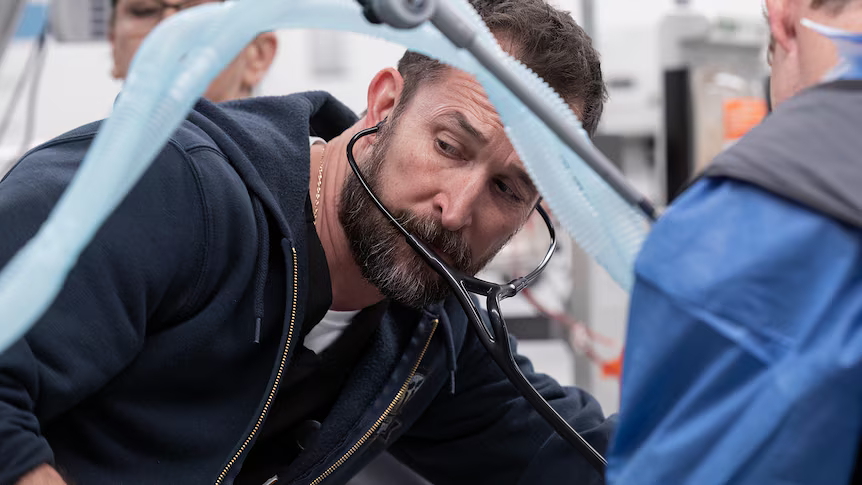It’s sickening to watch a healthcare worker trying to help someone, to save a life even, whilst lacking the right tools, or resources to do so. Not enough blood, donor organs, equipment, beds, staff.
There are some moments in The Pitt, a 15-part Max series spanning a single 12-hour workday (with three extra hours of overtime following a mass shooting event) in an emergency room in a Pittsburgh hospital, which are gruelling to watch. Patients, shot in the heart, losing blood too quickly to replace, a young girl dying because she fished her sister out of a pool but couldn’t save herself, the crimson underpants of a miscarriage. Bellies bulging, skulls slicing, flesh oozing, veins spurting.
The hospital staff are peed on, punched in the head, splattered in blood, startled by rats that escape from a patient’s clothing, blamed for unavoidable deaths. It’s brutal.
And still, they come to work.
In a closing scene, the lead character, Dr Michael “Robby” Robinavitch, played superbly by Noah Wyle, says to the assembled staff, who are wired, exhausted, relieved and devastated: “This place will break your heart.” He tells them to be proud of what they did, of the lives they saved, but that it’s also okay to cry: “It’s just grief leaving the body.”
The social problems blaze like flares through the episodes: fentanyl, homelessness, gun violence, custody battles, lost young men, junior doctors struggling to pay their own rent, a crowded emergency room that never empties.
Underpinning it all is the trauma of the most senior doctor, Dr Robby. This day is the fifth anniversary of the death of the former head doctor, Dr Adamson, from COVID-19 complications, one that has weighed on Dr Robby ever since, as he was forced to eventually divert sparse resources from Adamson to a younger patient in need. Both died.
They didn’t have enough resources then, and are understaffed now.
The moral injury is clear, and it is what grabs your heart throughout the show.
Doctors and nurses feel it deeply
Moral injury is generally defined as “the psychological, social and spiritual impact of events involving betrayal or transgression of one’s own deeply held moral beliefs and values occurring in high stakes situations.”
The term was first used to described soldiers returning from war, who felt their moral code had been burned in some way. These were “transgressions that involve[d] people doing or failing to do things themselves (deliberately or unwittingly); and being exposed directly or indirectly to transgressions on the part of someone else (betrayal, bearing witness to grave inhumanity).”
This can lead to a grief, shame, and a range of mental consequences, including depression, anxiety, lack of belief in people, justice, or particular moral causes.
It was during the overwhelm of COVID that many first began to become aware of moral injury, and the literature on it has mounted rapidly in the past five years.
A guide to moral stress among healthcare workers during COVID-19 was produced in 2020 by Phoenix Australia, Centre for Post Traumatic Mental Health. It describes moral stress as a spectrum: “In the context of COVID-19 a severe moral stressor would be, for example, a healthcare worker having to, due to lack of resources, deny treatment to a patient they know will die without that treatment.”
More common and less severe moral stressors would include “being unable to provide optimal care to non-COVID-19 patients, and concern about passing the virus on to loved ones.”
When there are systemic problems, shortages of staff, lack of money, insufficient organ donors, delays in treatment, and over-burdened medical systems with long wait times in or out of emergency systems, doctors and nurses can feel it deeply.
Sometimes they are unable to help in the way they have been trained, and sometimes, they are too exhausted. It’s the difference between saying: “We did all we could” to a patient’s relatives, and saying “We did our best with the resources available, but it wasn’t enough.”
This is why it is recommended that in ICU settings, triage staff, who assess priority of need, are separated from clinical staff.

